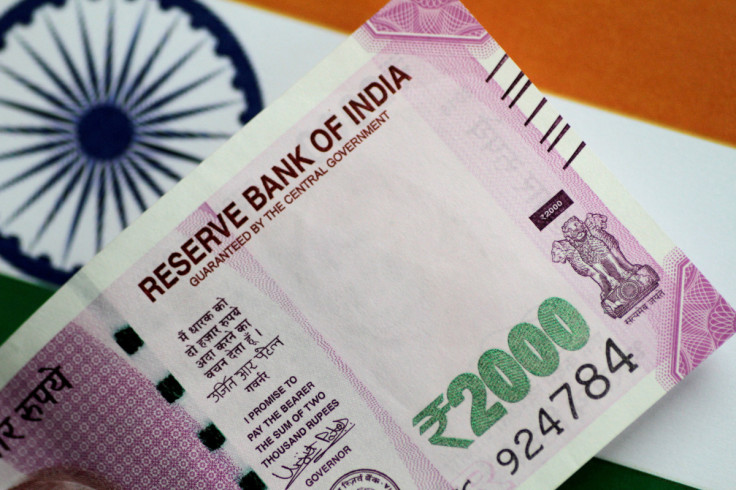India And UAE Agree To Trade In Local Currencies, Reducing Dependence On USD

KEY POINTS
- The RBI and the Central Bank of UAE signed two MoUs to promote using INR and the AED for bilateral trade
- The agreement is expected to ease financial flows between India and its third-largest trade partner
- The pact is the latest in a growing trend of emerging economies reducing their dependence on the U.S. dollar
India and the United Arab Emirates (UAE) have agreed to use their own local currencies for cross-border transactions.
In what appears to be New Delhi's latest move to expand the reach of the Indian rupee (INR), the Reserve Bank of India (RBI) and the Central Bank of UAE signed two memoranda of understanding on July 15 to promote the use of the INR and the UAE Dirham (AED) for bilateral trade and domestic payment systems across borders.
Indian Prime Minister Narendra Modi, who stopped by Abu Dhabi while returning to India from Paris, was present with UAE President Sheikh Mohamed Bin Zayed Al Nahyan during the exchange of the MoUs.
"The India-UAE agreement aligns with India's larger objective of promoting an INR-based international trade settlement mechanism," Rajeesh Kumar, associate fellow and acting center coordinator at Manohar Parrikar Institute for Defence Studies and Analyses, told International Business Times.
The agreement is expected to ease financial flows between India and its third-largest trade partner, which is also home to a large number of overseas Indians.
The pact will put in place a local currency settlement system (LCSS) that will encourage importers and exporters to use INR and AED in bilateral trade. All current account transactions and permitted capital account transactions are covered in the signed MoU.
"Creation of the LCSS would enable exporters and importers to invoice and pay in their respective domestic currencies, which in turn would enable the development of an INR-AED foreign exchange market," the RBI said in a statement, as per The Times of India.
"This arrangement would also promote investments and remittances between the two countries. Use of local currencies would optimize transaction costs and settlement time for transactions, including for remittances from Indians residing in UAE," it added.
The pact also includes the interlinking of payment and messaging systems, where India's Unified Payments Interface (UPI) will be linked with the UAE's Instant Payment Platform (IPP) to help users in India and UAE make quick, secure cross-border transactions.
The pact will also see the interlinking of the RuPay switch and UAESWITCH, thus allowing "mutual acceptance of domestic cards and processing of card transactions," the RBI said further.
The new pact comes as many emerging economies across the globe are asserting their own local currencies while trying to wean the financial world off its dependence on the U.S. dollar as the globe's reserve currency and the most-used currency in trade.
"Implementing an INR-based international trade settlement mechanism can enhance India's trade with dollar-shortage countries, stabilize the INR against the USD and promote its acceptance as a regional/global currency," Kumar told IBT.
Apart from India, countries like China and Russia have also undertaken efforts to find alternatives to the U.S. dollar and promote their own currencies for trade. Developing countries have even shown exasperation over the buck's reign in global finance.
Members of the BRICS bloc hinted at talks about a new common currency to challenge the dollar's dominance. However, India's Foreign Minister S. Jaishankar recently said a new currency is not currently on the bloc's agenda.
Through pacts such as the recent one with UAE, India might not intentionally be aiming for de-dollarization but is adding to the growing trend of emerging economies reducing their reliance on the dollar and attempting to challenge a unipolar currency world.
In recent years, "there have been general perceptions that stature of the U.S. as a single world power is shaken and its strategic position is declining and it no more can dictate the world politics. Many believe that China is going to emerge as a major contender of U.S.," Fazzur Rahman Siddiqui, author and senior research fellow at the Indian Council of World Affairs (ICWA), told IBT.
Countries like India, France, Saudi Arabia, Brazil, Pakistan, Bolivia and Iraq have already conducted yuan-based trade transactions or shown their willingness to do so.
Moreover, "the Russian invasion of Ukraine took the story further" and "weakened" the position of the U.S., Siddiqui believes.
When it comes to the Ukraine war, the U.S. "has not been able to mobilize the world opinion in its own favor the way it had done in the case of the two Gulf wars. Even its closest Arab allies refused to fully side with the U.S. and they are pursuing their strategic autonomy," Siddiqui said.
Following the outbreak of the war, countries have also been reminded of how the dollar can be weaponized after the U.S. froze hundreds of billions of Moscow's dollar reserves.
Due to U.S.'s "growing reliance on economic sanction as a political tool, many countries are shifting towards trading in local currency to evade the crisis," Siddiqui added. "It is not only Russia which is facing this sort of action by the U.S. but also Iran and recently Afghanistan."
Despite geopolitical tensions triggering slight changes to the global economic order, it is still likely that the dollar will dominate the financial world for a long time.
"The U.S. dollar remains the primary currency for global transactions and the valuation of goods," Kumar explained. "The dollar accounts for about 60% of central bank reserves in 2022. It is still the primary invoicing currency across the world. The dollar's role will diminish if oil producers shift to non-dollar settlements like renminbi, rubles, rupees, dirham, or non-dollar stablecoins."
"Regarding the possibility of multi-currency order- multiple major reserve currencies could emerge based on trading relationships (for example, rupee, euro, renminbi and USD). However, fully replacing the dollar's global dominance would likely take decades," he added.
© Copyright IBTimes 2024. All rights reserved.






















